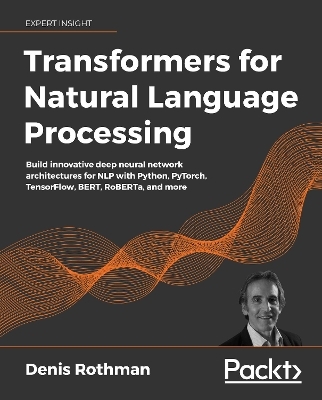
Transformers for Natural Language Processing
Packt Publishing Limited (Verlag)
978-1-80056-579-1 (ISBN)
Key Features
Build and implement state-of-the-art language models, such as the original Transformer, BERT, T5, and GPT-2, using concepts that outperform classical deep learning models
Go through hands-on applications in Python using Google Colaboratory Notebooks with nothing to install on a local machine
Test transformer models on advanced use cases
Book DescriptionThe transformer architecture has proved to be revolutionary in outperforming the classical RNN and CNN models in use today. With an apply-as-you-learn approach, Transformers for Natural Language Processing investigates in vast detail the deep learning for machine translations, speech-to-text, text-to-speech, language modeling, question answering, and many more NLP domains with transformers.
The book takes you through NLP with Python and examines various eminent models and datasets within the transformer architecture created by pioneers such as Google, Facebook, Microsoft, OpenAI, and Hugging Face.
The book trains you in three stages. The first stage introduces you to transformer architectures, starting with the original transformer, before moving on to RoBERTa, BERT, and DistilBERT models. You will discover training methods for smaller transformers that can outperform GPT-3 in some cases. In the second stage, you will apply transformers for Natural Language Understanding (NLU) and Natural Language Generation (NLG). Finally, the third stage will help you grasp advanced language understanding techniques such as optimizing social network datasets and fake news identification.
By the end of this NLP book, you will understand transformers from a cognitive science perspective and be proficient in applying pretrained transformer models by tech giants to various datasets.What you will learn
Use the latest pretrained transformer models
Grasp the workings of the original Transformer, GPT-2, BERT, T5, and other transformer models
Create language understanding Python programs using concepts that outperform classical deep learning models
Use a variety of NLP platforms, including Hugging Face, Trax, and AllenNLP
Apply Python, TensorFlow, and Keras programs to sentiment analysis, text summarization, speech recognition, machine translations, and more
Measure the productivity of key transformers to define their scope, potential, and limits in production
Who this book is forSince the book does not teach basic programming, you must be familiar with neural networks, Python, PyTorch, and TensorFlow in order to learn their implementation with Transformers.
Readers who can benefit the most from this book include experienced deep learning & NLP practitioners and data analysts & data scientists who want to process the increasing amounts of language-driven data.
Denis Rothman graduated from Sorbonne University and Paris-Diderot University, designing one of the very first word2matrix patented embedding and patented AI conversational agents. He began his career authoring one of the first AI cognitive natural language processing (NLP) chatbots applied as an automated language teacher for Moët et Chandon and other companies. He authored an AI resource optimizer for IBM and apparel producers. He then authored an advanced planning and scheduling (APS) solution used worldwide.
Table of Contents
Getting Started with the Model Architecture of the Transformer
Fine-Tuning BERT Models
Pretraining a RoBERTa Model from Scratch
Downstream NLP Tasks with Transformers
Machine Translation with the Transformer
Text Generation with OpenAI GPT-2 and GPT-3 Models
Applying Transformers to Legal and Financial Documents for AI Text Summarization
Matching Tokenizers and Datasets
Semantic Role Labeling with BERT-Based Transformers
Let Your Data Do the Talking: Story, Questions, and Answers
Detecting Customer Emotions to Make Predictions
Analyzing Fake News with Transformers
Appendix: Answers to the Questions
| Erscheinungsdatum | 03.02.2021 |
|---|---|
| Verlagsort | Birmingham |
| Sprache | englisch |
| Maße | 191 x 235 mm |
| Themenwelt | Informatik ► Theorie / Studium ► Künstliche Intelligenz / Robotik |
| ISBN-10 | 1-80056-579-8 / 1800565798 |
| ISBN-13 | 978-1-80056-579-1 / 9781800565791 |
| Zustand | Neuware |
| Informationen gemäß Produktsicherheitsverordnung (GPSR) | |
| Haben Sie eine Frage zum Produkt? |
aus dem Bereich


